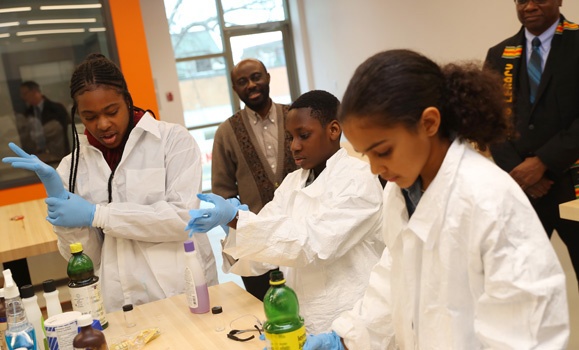A university-community partnership that encourages participation in STEM (science, technology, engineering, math) professions by African Nova Scotia youth has been awarded new federal funding.
This investment ÔÇö $101,200 yearly, over three years ÔÇö will enable ImhotepÔÇÖs Legacy Academy (ILA) to continue offering hands-on experiential after-school science activities to students of African heritage at schools in Nova Scotia.
The funding comes from the Natural Sciences and Engineering Research Council of CanadaÔÇÖs (NSERC) PromoScience program. This program supports hands-on learning experiences for young students.
ÔÇ£Receiving funding from the PromoScience program means that we will be able to continue operating the After-School Program for African Nova Scotian students across Nova Scotia both in person and virtually,ÔÇØ says Sidney Idemudia, executive director of ImhotepÔÇÖs Legacy Academy. ÔÇ£It will also allow us to deliver our After-School Program across Nova Scotia in French to Francophone students.ÔÇØ
Inspiring minds
In 2003, ILA began as an after-school pilot project at Caledonia Junior High School in Dartmouth. Conceived by three local educators (Kevin Hewitt, Barb Hamilton-Hinch, and Wayn Hamilton), through a partnership amongst ╣¹¢┤╩ËãÁ's Department of Physics, the Black Student Advising Centre, and the Nova Scotia Department of Education's African Canadian Services Branch, the project was designed to provide an opportunity for African Nova Scotian (ANS) junior high school learners to engage in activities designed to strengthen their math and science aptitude.
The pilot project employed science and engineering students from ╣¹¢┤╩ËãÁ to deconstruct science concepts using hands-on activities, presented in a friendly and casual atmosphere. The intent of that approach was (1) to engender increased engagement in scientific inquiry among ANS learners and (2) to increase their interest in pursuing STEM studies at the post-secondary level.
Since that initial project, Imhotep's Legacy Academy now has 14 youth programs operating at different times throughout the year, reaching an average of 1,600 youth per year. Outstanding program participants may also apply for a four-year renewable scholarship toward STEM studies at ╣¹¢┤╩ËãÁ University.
ILA's growth has been guided by its Board of Directors, under the leadership, for the past eight years, of J. Pemberton Cyrus, principal investigator for the grant. He is chair of the Department of Industrial Engineering at ╣¹¢┤╩ËãÁ University and in 2019 was awarded Engineers Nova Scotia's J.D. Fraser Service Award for his longstanding and ongoing volunteer work with ILA and other organizations.
ÔÇ£We are very grateful for this NSERC PromoScience funding and will be using it to continue to grow our programs and innovate in STEM outreach,ÔÇØ says Dr. Cyrus. ÔÇ£Long-term commitment to the growth and development of our youth is critically important for the future of Nova Scotia and Canada.ÔÇØ
ILA operates across Nova Scotia, influencing the lives of African Nova Scotian youths by making STEM subjects accessible and interesting ÔÇô while also supporting their academic success.
ÔÇ£Students are engaged in various activities, events and programs that promote, encourage and teach STEM studies by mentors of African Heritage,ÔÇØ says Idemudia. ÔÇ£Junior high school students have hands-on engagement in STEM activities, get assistance with their math by our mentors, and high school students get tutored in science and math by university students of African heritage.ÔÇØ
Additionally, ILA has been creating videos of the After-school program activities that mentors can use to prepare before teaching students, and reference while teaching students.
ÔÇ£Students can use the activity videos to learn independently from home or the classroom, teachers can use the videos to teach students in or out of the classroom, and parents can use the videos to teach children at home,ÔÇØ says Idemudia.
Watch:
Meeting the challenge
Although the 2020-21 program year has been difficult due to COVID-19 restrictions, ILAÔÇÖs dedicated staff has been able to adapt and transition its hands-on programs to virtual operations for secondary school learners.
ILA hires university students of African heritage to deliver its STEM programs.╠² These mentors, themselves, are enrolled in post-secondary STEM studies and other disciplines at Nova Scotian universities, including ╣¹¢┤╩ËãÁ University, Acadia University, and St. Francis Xavier University, Saint MaryÔÇÖs University, Cape Breton University, Mount Saint Vincent University, and the Nova Scotia Community College.╠² They are role models to the participants and provide powerful examples of Blacks doing and understanding science, math, and technology.╠² Asher Trim-Gaskin, ILAÔÇÖs Program Manager, leads program staff through the effective day-to-day operation of ILA programsÔÇöno small feat during a pandemic. ╠²
ÔÇ£Since our mentors could not meet with our student participants in person, we had to meet and engage with them virtually,ÔÇØ says Idemudia. ÔÇ£With our after-school program, we mailed STEM kits to students and mentors bi-weekly to ensure hands-on engagement between mentors and student participants.ÔÇØ
In addition, ILAÔÇÖs Virtual School tutoring Program had an online service prior to the pandemic, so they were able to continue that component.╠² ILA also moved their FIRST LEGO League robotics Program, ILA Coding Program, annual STEM Quiz Tournament and other activities online.
Watch:
Looking forward
The future looks incredibly bright for ILA. They plan to continue delivering their core programs, supplementary initiatives, and auxiliary events, and are piloting the delivery of their .
Using lessons learned from the pandemic, ILA plans to maintain a hybrid delivery model of their programs. They plan to engage students in-person, at their schools, and mail STEM kits to students that are unable to join their sessions in person. This is especially important to rural students who may not have an ILA program at their schools.
Learn more about ImhotepÔÇÖs Legacy Academy and register for its programs here.
╠²

